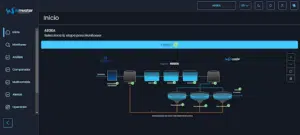Explore Isle’s Brazil’s Climate Trial Reservoir in our “Success Stories” blog series.
Reshmina William, PhD (Project Manager, Isle Americas)
Brazil’s Climate Challenges
On February 12, 2022, the city of Petropolis, Rio de Janeiro received more rain in three hours than it had in the last thirty days combined. The storm, the largest recorded in the region since 1932, caused extensive flooding that destabilized the mountainside on which the city is built. In the resulting mudslides, nearly 200 people lost their lives.
Just one year later, Brazil was plunged into its most severe drought in 70 years. The drought covered nearly half of Brazil’s territory and impacted over 70% of its municipalities.
Climate change and deforestation are driving more frequent and extreme weather events for Brazil. The impacts of these events are often most strongly felt by the country’s most vulnerable populations. During the 2022 floods, many of those who lost houses and loved ones lived in favelas, impoverished, informal communities on the outskirts of cities that are not designed to withstand this scale of flooding.
Addressing both climate change mitigation and resilience is thus clearly of critical importance to Brazil. However, Brazil faces significant inequities in water and sanitation access, with 14% of the population lacking safely managed water and 41% still lacking safely managed sanitation.
To address gaps in water and sanitation services, Brazil is turning to innovative technologies that improve utilities’ climate resilience while minimizing greenhouse gas emissions. The 2021 Legal Framework for Startups (the “Brazilian Start-Up Act”) allows public entities to define contract requirements based on problems rather than technical specifications. This rewording of contract criteria enables private companies and startups to offer utilities fresh solutions to their challenges, ultimately fostering innovation.
The Brazilian Start-Up Act also supports the testing and piloting of new technologies, enabling utilities to trial solutions through contracts of up to R$1.6 million ($325,000 USD). When trials meet their objectives, follow-up contracts of up to R$8 million ($1.6 million USD) allow utilities to scale proven solutions. This approach focuses on fostering innovation and expanding access to impactful, scalable technologies.
The Brazil Trial Reservoir
The Brazilian Start Up Act aligns closely with the global Trial Reservoir program in its goal: to accelerate innovation in the water industry through the derisking of piloting and trials.
In November 2022, IDB Lab, the innovation and venture capital arm of the Inter-American Development Bank Group, sponsored a Trial Reservoir program specifically for Brazilian utilities. While IDB Lab has since adjusted its level of participation, the program continues to drive innovation in the sector.
This program enables utilities to procure technologies through local suppliers while addressing critical gaps in water and sanitation services. In addition, the Brazil Trial Reservoir aims to accelerate the implementation of novel technology solutions across the region, ultimately reducing greenhouse gas emissions across the Latin American water sector.
Isle provides additional support for this effort through a series of webinars designed to disseminate information about the Brazil Trial Reservoir and introduce Brazilian utilities to innovative technologies. Since their launch in 2023, these quarterly webinars have featured subject matter experts discussing topics ranging from digitization and AI to the circular economy and water reuse. In their first year, the webinars successfully reached a national audience, accruing nearly 3000 views on YouTube.
The Brazil Trial Reservoir’s first trial began implementation in late 2024.
AInwater – A Trial Reservoir Case Study

Aegea is the largest private sanitation company in Brazil, and a leader in water technology innovation. However, Aegea’s Bela Vista Sewage Treatment Plant has historically struggled with discharges that violate state water quality regulations. Aegea has turned to an AI-driven digital twin developed by Chilean start-up AInwater to predict plant operational changes that might lead to discharge violations, thus allowing their operators to adjust parameters accordingly.
AInwater’s Bela Vista digital twin will help Aegea meet its discharge requirements by monitoring, sensing, and optimizing treatment through virtual controls based on artificial intelligence. Specifically, the digital twin will automatically generate predictive alerts for key environmental compliance indicators, and optimize the plant’s aeration and activated sludge processes to reduce energy costs. The digital twin promises to not only improve water quality and significantly reduce Aegea’s OPEX, but also reduce the plant’s energy consumption and Scope 2 carbon emissions.
After four months of instrumentation and preparation, the pilot will officially launch in May 2025, with a two-month testing and validation period planned to begin in July 2025. If the trial concludes successfully in September 2025, Aegea has agreed to continue its AInwater subscription at the Bela Vista plant, with the possibility of installing the technology at its other plants.
“A Beacon of Innovation”
When Rodrigo Valladares first joined the Trial Reservoir team in March 2023, he was particularly drawn to the technological implications of the AInwater trial. From earlier conversations with the company, “I knew this technology could potentially move the needle toward reducing energy consumption in wastewater treatment plants,” he says.
Now, Rodrigo can see how this project has helped him grow personally. “I learned a lot from [its] preparation,” he says. Not only did he have to absorb the technological details of AInwater’s platform, but he also had to brush up on Brazilian regulations, from mandated state discharge parameters to the legal intricacies involved with putting together trial documentation.
From a broader perspective, Rodrigo sees this trial as a game-changer for the Brazilian water sector. Because of the Trial Reservoir’s unique procurement and financing structure, “it sets the basis for future initiatives within utilities and how they perceive, manage, and adopt innovative solutions.”
In the future, Rodrigo hopes to see the Trial Reservoir approach applied to a broader range of technologies and sectors. “I see the Trial Reservoir program as the beacon of innovation around water/energy/decarbonization piloting and adoption initiatives,” he says.


